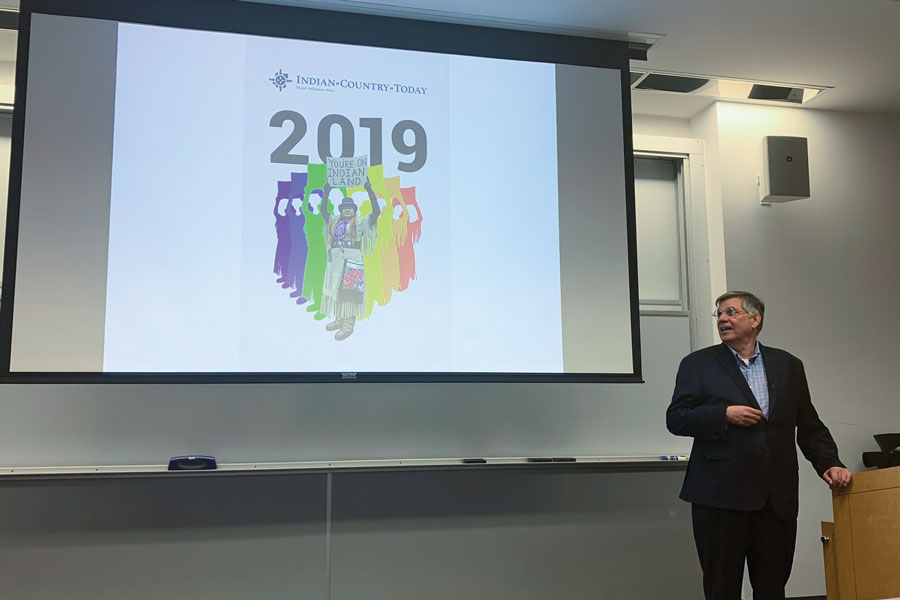Mark Trahant presents Native American political representation
Rayna Song/ The Daily Northwestern
Indian Country Today editor Mark Trahant spoke in the McCormick Foundation Center about the political representation of Native Americans in the United States.
February 7, 2020
Indian Country Today editor Mark Trahant spoke in the McCormick Foundation Center on Thursday about the political representation of Native Americans in the United States.
The publication is a daily digital news platform that focuses on Indigenous communities, covering national stories from a Native perspective. Part of that coverage relates to both local and national elections, subjects of Trahant’s research.
Trahant said more than 100 Native Americans ran for state and national office during the 2018 midterms. In particular, two Native women, U.S. Reps. Sharice Davids (D-Kan.) and Deb Haaland (D-NM), were elected to the U.S. Congress.
“For the first time, more native women than men ran and made history by winning seats in Congress,” Trahant said.
Their elections doubled the number of Native Americans in Congress, as Davids and Haaland joined U.S. Rep. Tom Cole (R-Okla.) and U.S. Rep Markwayne Mullin (R-Okla.).
Medill Dean Charles Whitaker helped organize the event and said it is important to heighten awareness on campus about what Indian Country Today does.
“Indian Country Today is a really important voice for Native American issues that don’t get much coverage in the national media,” Whitaker said.
Trahant said that the current presidential election gave his publication the opportunity to bring Native issues to the national stage.
In August 2019, several Democratic presidential candidates attended a Native American forum in Iowa, and Trahant moderated the event.
After the forum, Montana Gov. Steve Bullock, one of the candidates, accepted an invitation from Trahant for an interview with Indian Country Today in Arizona. This is believed to be the first interview of a presidential candidate in a Native newsroom, Trahant said.
Trahant also addressed concerns about the decline of opportunities in the media industry. He said he believed the situation to be the exact opposite, and that “this is a time of enormous opportunity” because of the widespread usage of mobile phones and its capabilities to help facilitate more efficient reporting.
“The narrative about media is often about decline. Shrinking staffs. Less resources,” Trahant said. “That’s not the world I know. Indian Country Today is about creating something new, adding resources, and best of all, ideas.”
Whitaker said Indian Country Today was able to do phenomenal journalism with very cost-efficient methods. By using only cell phones, the publication shows that reporters don’t need tons of expensive equipment to do impactful journalism in a digital age.
Imani Harris, a Medill sophomore, said the presentation resonated with her because black people and Native American people have a tied history in the United States.
“It made me think about all-black publications… creating media for black people, by black people,” said Harris.
Trahant ended the presentation by talking about how the image of Native Americans might change due to their increasing representation in politics.
“If you think about the images that people will think of when they think of Native Americans, particularly after seeing political commercials, perhaps they will think about dances or songs or artwork,” Trahant said. “But it might be that now people will think, ‘Wow, these are the people who govern.’”
Email: [email protected]
Related Stories:
– Northwestern professor emphasizes Native history and inclusion
– 30 Days of Indigenous programming to be held throughout November


